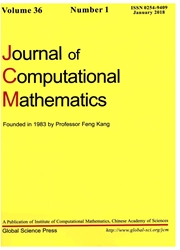

 中文摘要:
中文摘要:
这里,我们关于大分子 microsphere 集中于阶段分离的数字模拟合成(MMC ) hydrogel。模型基于时间依赖者 Ginzburg 四轮马车(TDGL ) 有网状的免费精力的方程。一无条件地,精力马厩差别计划基于相应精力的凸的切开被建议功能。在数字实验,我们观察到模仿阶段分离的整个过程要求一更加长的时间。我们也注意到全部的免费精力在起始的舞台显著地变化并且在下列时间稍微变化。把性质基于这些,我们使用走策略改进计算效率的适应时间。时间步 adaptivity 的应用程序不能仅仅决定解决方案的动态变化精确地而且显著地为长时间模拟节省中央处理器时间,这被发现。
 英文摘要:
英文摘要:
Here we focus on the numerical simulation of the phase separation about macromolecule microsphere composite (MMC) hydrogel. The model is based on time-dependent Ginzburg- Landau (TDGL) equation with the reticular free energy. An unconditionally energy stable difference scheme is proposed based on the convex splitting of the corresponding energy functional. In the numerical experiments, we observe that simulating the whole process of the phase separation requires a considerably long time. We also notice that the total free energy changes significantly in initial stage and varies slightly in the following time. Based on these properties, we apply the adaptive time stepping strategy to improve the computational efficiency. It is found that the application of time step adaptivity can not only resolve the dynamical changes of the solution accurately but also significantly save CPU time for the long time simulation.
 同期刊论文项目
同期刊论文项目
 同项目期刊论文
同项目期刊论文
 期刊信息
期刊信息
